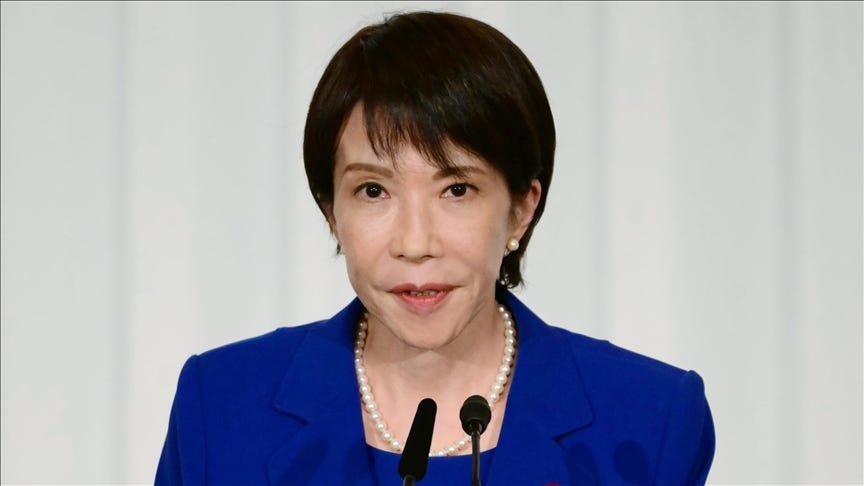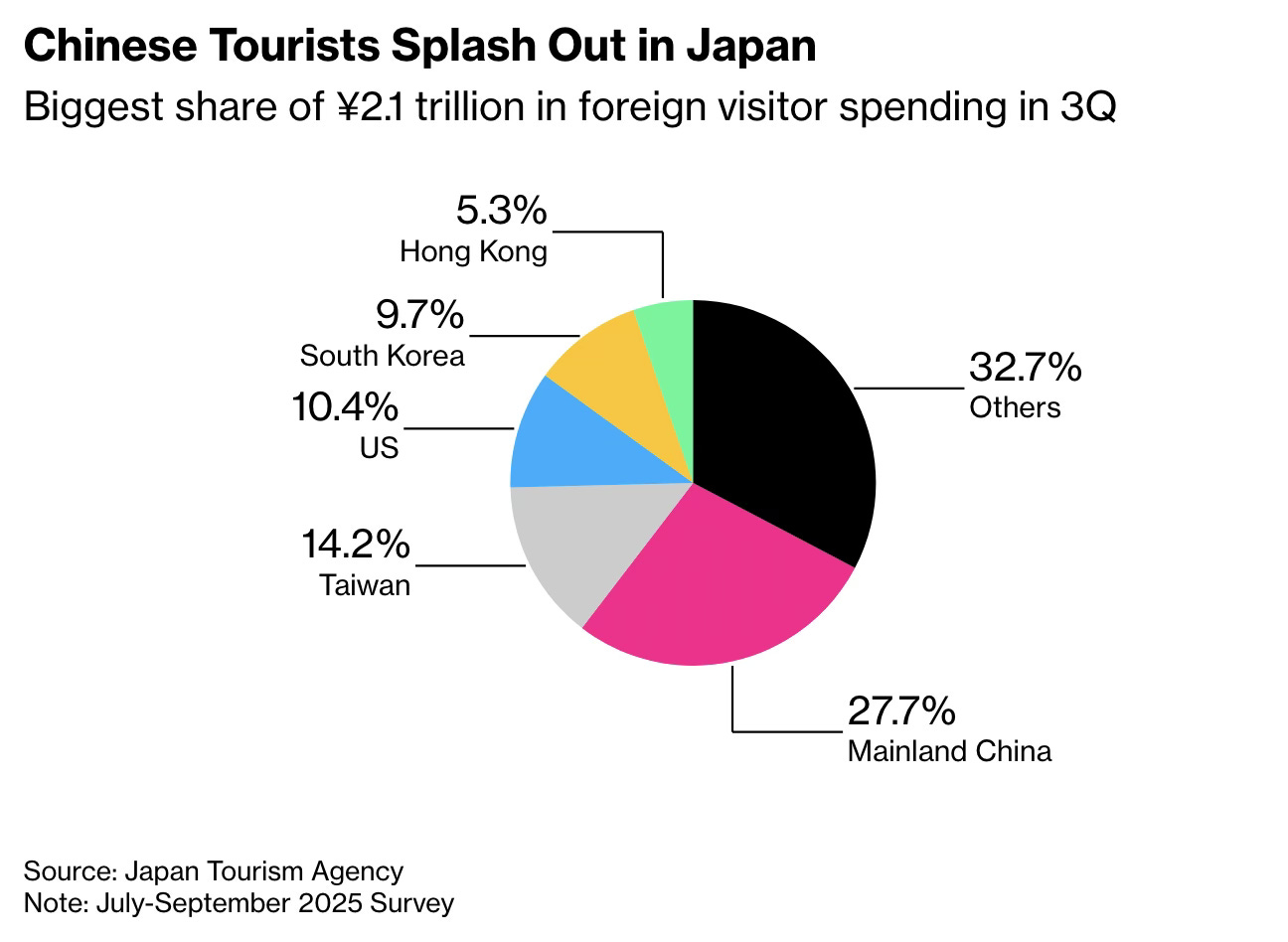Asia Communique
Beijing Turns Up the Heat: Japan Stocks Tumble as Taiwan Row Escalates
Dear Readers,
Welcome to the 17 November edition of Asia Communique. After a brief family-related trip, I’m back with a roundup of the past 24 hours in Asian defense and geopolitics — from rising Japan–China tensions over Taiwan to intensified PLA activity, fresh instability in South Asia, and new regional cooperation moves. Here’s what matters today.
China‑Japan: Diplomatic friction over Taiwan
Japanese Prime Minister Sanae Takaichi
Tokyo sends envoy to Beijing. Japanese media reported that Masaaki Kanai, director‑general of the foreign ministry’s Asia and Oceania bureau, will travel to China to calm the diplomatic row ignited by Prime Minister Sanae Takaichi’s suggestion that a Chinese attack on Taiwan could threaten Japan’s survival and trigger the right to collective self‑defense. Beijing reacted sharply: a Chinese foreign ministry spokesperson warned that Japanese intervention would result in a “crushing” defeat and the foreign ministry summoned Japan’s ambassador. Taipei’s President Lai Ching‑te urged China to exercise restraint and return to a rules‑based order.
“Rights enforcement” patrol in disputed waters. As the spat simmered, China’s Coast Guard sent a vessel formation into the Senkaku/Diaoyu islands, which Japan administers but China claims. Beijing described the patrol as a legal “rights enforcement” operation. The move followed incendiary rhetoric from China’s consul general in Osaka, who said Japan’s “dirty head that sticks itself out must be cut off.” Tokyo protested and summoned China’s ambassador. China then issued a travel advisory urging its citizens to avoid Japan, and Chinese airlines offered free ticket changes or refunds.
Japanese tourism and retail stocks dropped sharply on Monday after Beijing warned its citizens against traveling or studying in Japan, escalating an ongoing diplomatic row over Taiwan. Shares in Mitsukoshi–Isetan’s parent company fell more than 10%, while Shiseido, Takashimaya, Fast Retailing (Uniqlo), and Tokyo Disney operator Oriental Land all slid over 5%. Japan Airlines and ANA also declined on fears of a broader hit to inbound travel. China—one of Japan’s biggest sources of tourists and students—urged citizens to reconsider study plans, warned those already in Japan to monitor their safety, and Chinese airlines began offering flight refunds. The market reaction follows comments by Prime Minister Sanae Takaichi suggesting Japan could use force under its 2015 security law if a Chinese attack on Taiwan threatened Japan’s survival. A Kyodo poll shows the public split on whether Japan should exercise collective self-defence in a Taiwan conflict. Chinese and Japanese officials are set for talks on Tuesday, but with tensions rising, markets appear to be bracing for a prolonged chill in bilateral ties.
Japanese public opinion split. A Kyodo News poll found Japanese voters sharply divided over whether to exercise collective self‑defense if China attacks Taiwan; 48.8 % supported the use of force while 44.2 % opposed it. Despite the divide, more than 60 % backed Takaichi’s plan to raise defense spending to 2 % of GDP.
Why it matters: The diplomatic row underscores how Taiwan’s security is reshaping regional alliances. Japan’s willingness to signal a collective defense commitment, even ambiguously, prompted harsh warnings from Beijing and prompted Chinese military and coast guard actions. The Japanese public’s split illustrates domestic uncertainty about risking conflict while supporting bolstered deterrence. The coming days will reveal whether Kanai’s mission can prevent a prolonged chill in Japan–China ties.
Risk factor for markets: Medium to high.
But a large scale disruption isn’t expected. Both sides will slowly diffuse the tensions over coming days.
Taiwan: Growing Chinese military pressure
Air and naval incursions surge. Taiwan’s Ministry of National Defense reported that within 24 hours up to the morning of 16 November, 30 Chinese military aircraft and seven naval vessels were detected near Taiwan; 17 aircraft crossed the median line of the Taiwan Strait and entered Taiwan’s air defense identification zone (ADIZ) in the north, south‑west and south‑east. Taipei responded by scrambling aircraft and deploying missile systems. A day earlier, 20 sorties had been recorded
G7 statement reinforces rules‑based order. The increase in Chinese sorties coincided with the Group of Seven foreign ministers’ meeting in Tokyo. Their communique reaffirmed the importance of peace and stability across the Taiwan Strait and opposed unilateral attempts to change the status quo by force.
“We emphasized the importance of maintaining peace and stability across the Taiwan Strait, and opposed any unilateral attempts to change the status quo, particularly by force or coercion. We encouraged the peaceful resolution of cross-Strait issues through constructive dialogue. We also expressed support for Taiwan’s meaningful participation in appropriate international organizations,” a statement issued by the G7 Foreign Ministers said.
Why it matters: These incursions show Beijing maintaining steady military pressure on Taiwan as political tensions rise. Crossing the median line, once an unofficial buffer, signals a shift toward challenging Taiwan’s defenses directly. Taipei relies on U.S. and partner support, but as noted above, even Japan debates how far it would go. The G7’s support bolsters Taiwan diplomatically but does not alter the military balance.
South Asia: Security incidents and political turmoil
Pakistan disrupts Afghan‑linked cell. Pakistani authorities announced the arrest of four members of an Afghan cell linked to the Tehreek‑e‑Taliban Pakistan (TTP) for a suicide bombing in Islamabad that killed 12 people. Investigators said the cell received orders from commanders in Afghanistan, underscoring cross‑border links between TTP factions and the Taliban’s de facto government. Officials warned that the ceasefire between Pakistan and Afghanistan remains fragile.
Bangladesh political crisis deepens. In Bangladesh, Sajeeb Wazed—son of deposed prime minister Sheikh Hasina—predicted that a special tribunal would sentence his mother to death over a deadly 2024 crackdown in which a UN report said up to 1,400 people were killed. Wazed vowed to block the February 2026 elections unless the ban on the Awami League is lifted and threatened increased protests. The interim government dismissed his comments, stressing that incitement to violence is unacceptable. Security forces have tightened patrols in Dhaka amid sporadic bombings and arson.
India arrests accomplice in Delhi car blast. In India, investigators arrested a Kashmir resident, Amir Rashid Ali, alleging he owned the car used in a suicide attack near Delhi’s Red Fort that killed 12 and injured 32. The National Investigation Agency believes Ali conspired with the bomber to plant explosives, though officials are cautious about blaming Pakistan to avoid escalation.
Why it matters: South Asia’s overlapping security crises highlight vulnerabilities. Pakistan’s arrests may strain ties with Afghanistan, which has denied harboring militants, while Bangladesh’s political turmoil risks violence in a nuclear‑armed region already grappling with polarized politics. India’s car bombing underscores the threat of domestic and cross‑border militancy even as New Delhi’s attention is focused on China.
Central Asia: Towards a regional bloc and focus on Afghanistan
Call for a Community of Central Asia. At the 7th Consultative Summit of Central Asian leaders in Tashkent, Uzbek president Shavkat Mirziyoyev proposed transforming the region’s periodic meetings into a formal Community of Central Asia to promote economic integration, environmental protection and collective security. The proposal builds on recent cooperation, such as the settlement of the Kyrgyzstan–Tajikistan border dispute and the five presidents’ joint visit to Washington.
Summit prioritizes Afghan stability. Regional media emphasized that the summit’s main agenda is Afghanistan’s instability. Ariana News reported that leaders from Central Asia and Afghanistan discussed trade connectivity, counter‑terrorism, and infrastructure. Uzbek leaders said lasting peace and prosperity in Central Asia cannot be achieved without a stable Afghanistan
Why it matters: Central Asia has historically been fragmented by overlapping alliances and border disputes. Mirziyoyev’s community proposal signals a desire for institutionalized cooperation that could strengthen resilience against external powers and provide a collective voice. However, progress hinges on resolving the conflict in Afghanistan—both a security threat and a potential gateway for trade and energy connectivity.
West & Southeast Asia: Other notable developments
Iran rejects unequal nuclear talks. Iran’s foreign minister accused the United States of being unprepared for “equal and fair” nuclear negotiations, saying Tehran would not accept talks aimed at achieving through diplomacy what Washington failed to secure by force. The comments reflect continued mistrust following Israeli and U.S. strikes on Iranian nuclear facilities earlier this year.
Indonesia readies troops for Gaza stabilization plan. Indonesia’s defense minister said Jakarta is preparing up to 20,000 soldiers for a potential international stabilization force in Gaza. The troops would focus on healthcare and reconstruction as part of a U.S.-led plan, though details and legitimacy remain unclear. Discussions were ongoing with Jordan’s King Abdullah.
Thailand’s king visits China. Thailand’s King Maha Vajiralongkorn made his first official visit to China. President Xi Jinping called the countries “family” and vowed closer cooperation on railways, artificial intelligence, aerospace and the digital economy. Both sides pledged to crack down on criminal gangs operating across their borders.
Why it matters: Iran’s hard line suggests the nuclear issue remains stalled, which could affect energy markets and regional security. Indonesia’s willingness to contribute a large force to a Gaza mission shows how Asian powers are stepping up involvement in Middle East peace efforts. Meanwhile, China’s embrace of Thailand strengthens Beijing’s influence in mainland Southeast Asia and underscores the growing importance of infrastructure and digital linkages.



